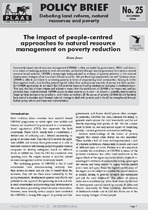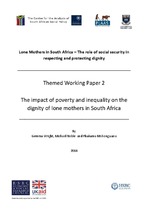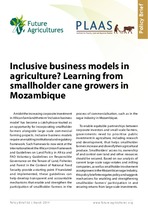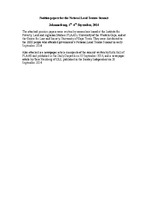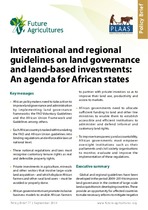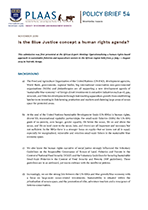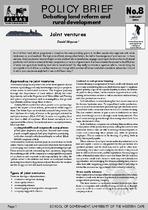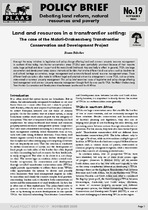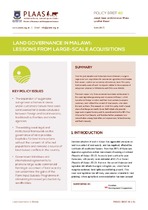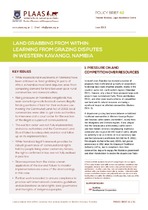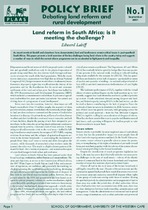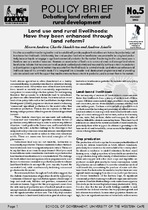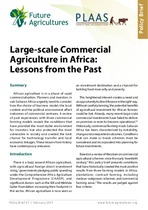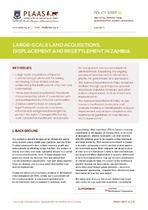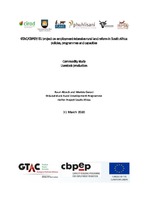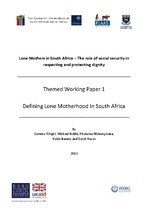Browsing Policy Briefs by Title
Now showing items 43-62 of 144
-
The impact of people-centred approaches to natural resource management on poverty reduction
(Institute for Poverty, Land and Agrarian Studies, University of the Western Cape, 2006)Community-based natural resource management (CBNRM) is often promoted by governments, NGOs and donors as a means of reducing poverty in rural communities, particularly through income-generation from various natural res ... -
The impact of poverty and inequality on the dignity of lone mothers in South Africa
(Institute for Poverty, Land and Agrarian Studies, University of the Western Cape, 2014)The purpose of this themed working paper is to explore lone mothers’ accounts of what dignity means in the context of their lives and how the experience of poverty and inequality impacts on their sense of dignity. This ... -
Inclusive business models in agriculture? Learning from smallholder cane growers in Mozambique
(Institute for Poverty, Land and Agrarian Studies, University of the Western Cape, 2014)Amidst the increasing corporate investment in African farmland the term ‘inclusive business model’ has become a catchphrase touted as an opportunity for incorporating smallholder farmers alongside large-scale commercial ... -
Inclusive business models in agriculture? Learning from smallholder cane growers in Mozambique
(Institute for Poverty Land and Agrarian Studies (PLAAS), 2014)Amidst the increasing corporate investment in African farmland the term ‘inclusive business model’ has become a catchphrase touted as an opportunity for incorporating smallholder farmers alongside large-scale commercial ... -
Institute for Poverty, Land and Agrarian Studies, University of the Western Cape
(Institute for Poverty, Land and Agrarian Studies, University of the Western Cape, 2014)The attached position papers were written by researchers based at the Institute for Poverty, Land and Agrarian Studies (PLAAS), University of the Western Cape, and at the Centre for Law and Society, University of Cape ... -
International and regional guidelines on land governance and land-based investments: An agenda for African states
(Institute for Poverty, Land and Agrarian Studies, University of the Western Cape, 2014)Global and regional guidelines have been developed in the period 2009–2014 to improve land governance in the context of large-scale land acquisitions in developing countries. These provide an opportunity for affected ... -
International and regional guidelines on land governance and land-based investments: An agenda for African states
(Institute for Poverty Land and Agrarian Studies (PLAAS), 2014) -
Is the Blue Justice concept a human rights agenda?
(PLAAS, 2019-11-21)What is Blue Justice? This concept is situated in social justice for small-scale fisheries (SSFs)—a narrative popular with civil society movements and academics to garner support for the adoption and implementation of the ... -
Joint ventures
(Institute for Poverty, Land and Agrarian Studies, University of the Western Cape, 2004)South Africa s land reform programme is based on the state providing grants to landless people who negotiate with white landowners to purchase land. The high price of land, among other factors, has led to the emergence ... -
Land and resources in a transfrontier setting
(Institute for Poverty, Land and Agrarian Studies, University of the Western Cape, 2005)Amongst the many initiatives in legislative and policy change affecting land and common property resource management in Southern Africa today, transfrontier conservation areas (TFCAs) seem particularly prominent because ... -
Land governance in Malawi: Lessons from large-scale acquisitions
(Institute for Poverty, Land and Agrarian Studies, University of the Western Cape, 2015)Over the past decade rural Malawians have witnessed a surge in large-scale land acquisitions for commercial agriculture that threaten their access, control and ownership of customary land. This policy brief presents ... -
Land grabbing from within: Learning from grazing disputes in Western Kavango, Namibia.
(Institute for Poverty, Land and Agrarian Studies, University of the Western Cape, 2015)In recent years Namibia has received a number of proposals from multinational agricultural corporations to develop large-scale irrigation projects, mainly in the country’s water-rich, north-eastern regions (Odendaal 2011). ... -
Land Reform in South Africa: Is it meeting the challenge?
(Institute for Poverty, Land and Agrarian Studies, University of the Western Cape, 2001)As recent events at Brendell and elsewhere have demonstarted, land and landlessness remain critical issues in post-apartheid South Africa. This paper presents a brief overview of the key challenges facing land reform in ... -
Land use and rural livelihoods: Have they been enhanced through land reform?
(Institute for Poverty, Land and Agrarian Studies, University of the Western Cape, 2003)It is often assumed that transferring land to rural households will provide people with valuable assets that can be productively used to enhance their livelihoods. Unfortunately, few rural people or land reform beneficiaries ... -
Large-scale commercial agriculture in Africa: Lessons from the past
(Institute for Poverty, Land and Agrarian Studies, University of the Western Cape, 2014)African agriculture is in a phase of rapid commercialisation. Planners and investors in sub-Saharan Africa urgently need to consider how the choice of business model, the local context and the political environment affect ... -
Large-scale commercial agriculture in Africa: Lessons from the past
(Institute for Poverty Land and Agrarian Studies (PLAAS), 2014)African agriculture is in a phase of rapid commercialisation. Planners and investors in sub-Saharan Africa urgently need to consider how the choice of business model, the local context and the political environment affect ... -
Large-scale land acquisitions, displacement and resettlement in Zambia
(Institute for Poverty, Land and Agrarian Studies, University of the Western Cape, 2015)The increase in demand for land can be attributed in part to rising incomes among middle-class Zambians, but also to the Zambian government’s drive to boost economic growth and reduce poverty by attracting foreign ... -
Livestock production
(GTAC, 2020-03-31)This paper is a thematic study for livestock production by smallholders and small-scale black commercial farmers in South Africa. Its aim is to identify the potential for successful expansion of the number of such farmers ... -
Lone Mothers in South Africa - The role of social security in respecting and protecting dignity.
(Institute for Poverty, Land and Agrarian Studies, University of the Western Cape, 2013)The purpose of this document is to define the group of people whom we are considering as part of the project ‘Lone Mothers in South Africa: The role of social security in respecting and protecting dignity’. Setting to ... -
Lone Mothers in South Africa - The role of social security in respecting and protecting dignity.
(Institute for Poverty, Land and Agrarian Studies, University of the Western Cape, 2013)The purpose of this document is to define the group of people whom we are considering as part of the project ‘Lone Mothers in South Africa: The role of social security in respecting and protecting dignity’. Setting to ...

